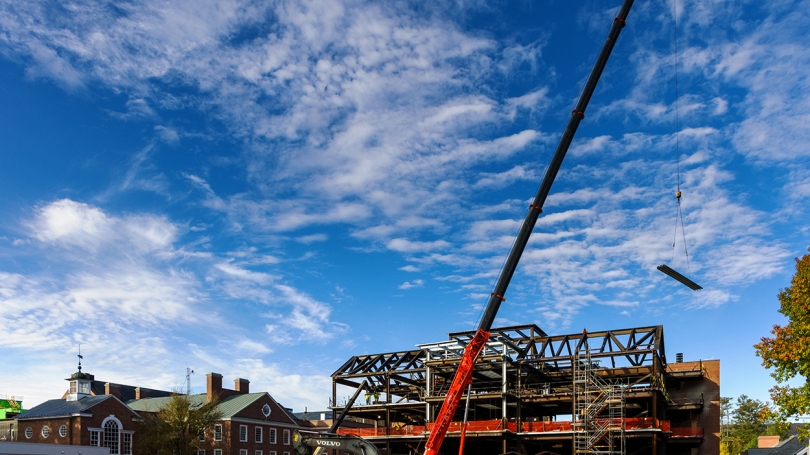
Construction Landmark for Dartmouth's Energy Institute
Posted on October 13, 2020 by Office of Communications
Opening in fall 2021, Arthur L. Irving Institute home will set a sustainability standard.

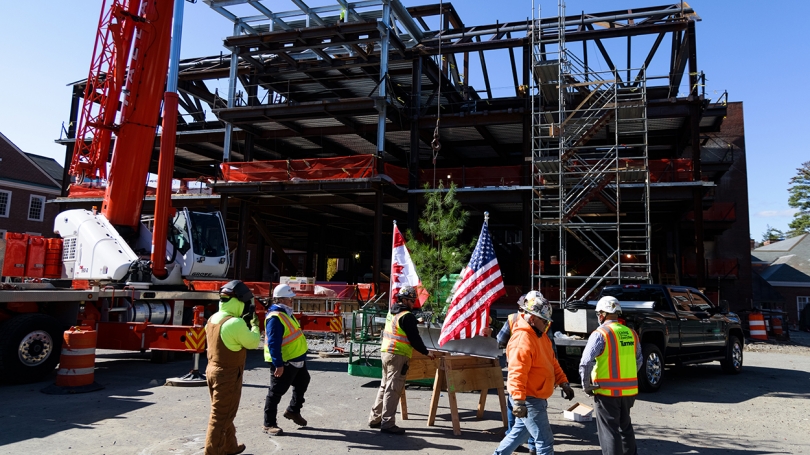
The 55,000-square-foot Irving building at the western end of Tuck Mall will be the most energy-efficient building on campus. The Canadian flag is also flying because the Irving Oil company is located in Saint John, New Brunswick, Canada.
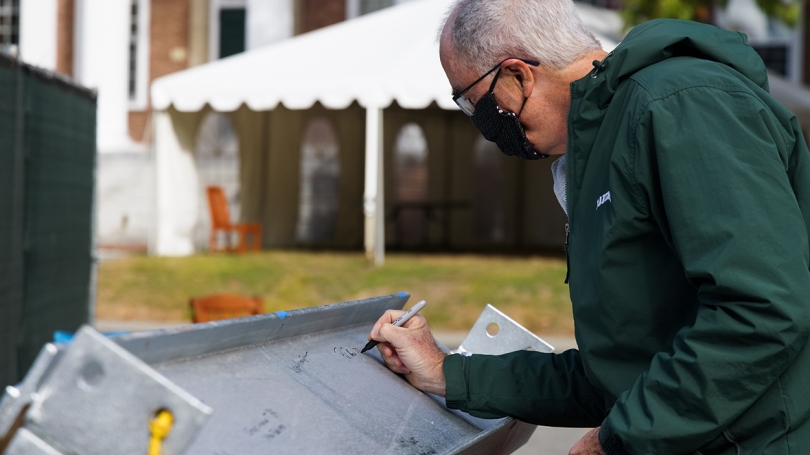
President Philip J. Hanlon ’77 signs his name to the final beam.
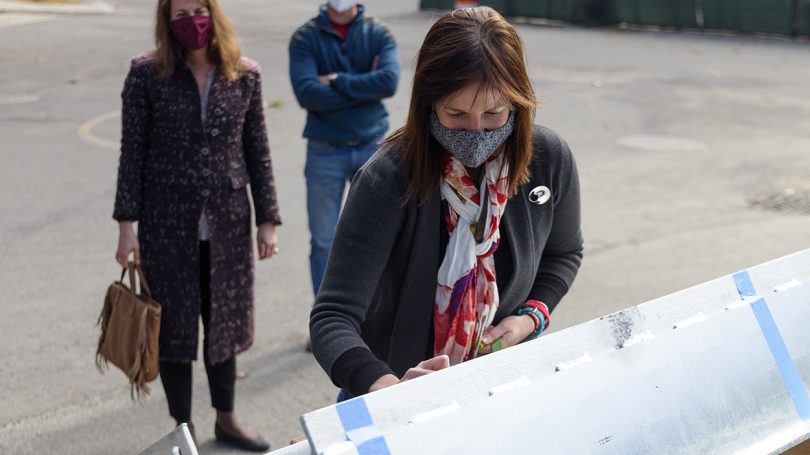
Professor of Environmental Sciences Elizabeth Wilson, the institute’s founding director, signs the final beam.

Construction workers, administrators, and faculty put their signatures on the building’s final beam, a topping-off tradition.

Construction workers await the beam’s arrival.

Culminating the topping-off ceremony, workers lower the beam into place.
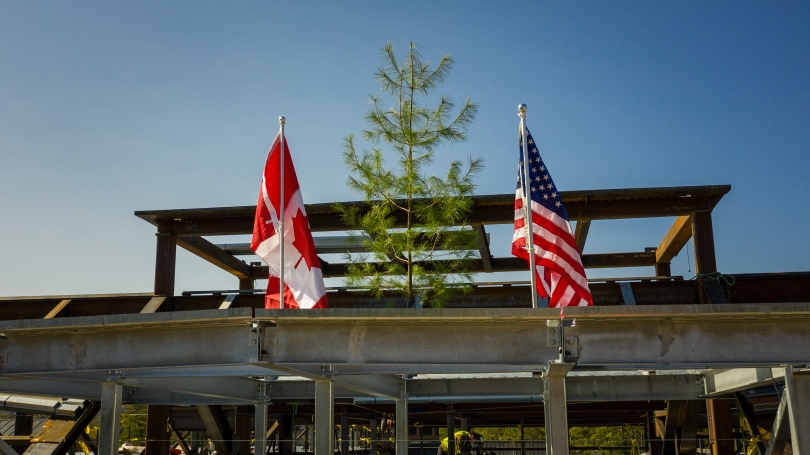
The final beam is a structural element in the rooftop fan room, part of a natural ventilation system that helps keep the building highly energy efficient.
A virtual celebration Tuesday marked the completion of the structural work on the new home of the Arthur L. Irving Institute for Energy and Society, advancing the institute's mission to realize an affordable, sustainable, and reliable energy future for the benefit of people around the world.
A construction crew placed the building's final beam in place as hundreds of alumni, students, and friends from around the world watched the traditional topping-off ceremony in a webcast. The 55,000-square-foot building, which is located at the western end of Tuck Mall, sits between the Tuck Business School and Thayer School of Engineering and squarely faces Baker-Berry Library, the heart of the Dartmouth campus.
"The physical location of the Arthur L. Irving Institute reflects the centrality of its mission to Dartmouth, and to the world," said President Philip J. Hanlon '77. "The institute is a crossroads—a place for students and faculty from across disciplines to apply their expertise to the study of our energy future and to embrace the topic of energy and society while expanding the boundaries of knowledge within their fields."
"This is a place where students and faculty will come together, inviting alumni, policymakers, social entrepreneurs, and industry leaders into the fold, to take on one of the great challenges facing humankind—how we meet the energy demands of the future in a way that sustains the planet while combating climate change. We look forward to examining these issues through a multitude of lenses, including the humanities, economics, and health science, to name a few, in rigorous pursuit of insights and solutions."
Thanks to 52 generous donors—including alumni, parents, and organizations in the energy sector—Dartmouth has raised $139.5 million to date of the $160 million needed to construct the building and endow the institute's dynamic program of education, research, and outreach. The lead gift to establish the institute was made jointly by Irving Oil; the Arthur L. Irving Family Foundation; and Arthur L. Irving (who received an honorary degree from Dartmouth in 2010); Sandra Irving (both Arthur L. Irving and Sandra Irving are adopted members of the Class of '72); and Sarah Irving '10, Tuck '14. The Irving family joined Tuesday's celebration from Saint John, New Brunswick, Canada.
Dartmouth's energy scholarship reaches back nearly two centuries, to when faculty members Dixi Crosby and Oliver Hubbard conducted experiments on crude oil. Today, more than 3,700 Dartmouth alumni work in fields related to the energy sector. While most university energy institutes focus on policy or a specific technology, Dartmouth's institute takes a broader, societal approach to energy issues and is dedicated to developing long-term solutions to energy challenges by nurturing collaboration among faculty, students, and community stakeholders.
"The Irving Institute is about bringing people together—about sharing knowledge, diverse perspectives, and a shared passion and common purpose in addressing important questions at the intersection of energy and society," said Sarah Irving, a member of the institute's board of advisors. "I can think of no better place than Dartmouth to prepare future leaders in business, energy, and society, to address energy challenges from a multidisciplinary approach."
Arthur Irving added, "The earliest thinking in the creation of the institute was how it could make a difference in the lives of students at Dartmouth and how they in turn would help make a significant difference in the world."
'Very Different Energy and Society Questions'
At the event, Professor of Environmental Sciences Elizabeth Wilson, the institute's founding director, highlighted several achievements to date, including the launch of academic courses, co-curricular activities, a mix of outreach activities, and grant programs for students and faculty.
"It's been wonderful to see our colleagues across Dartmouth come with very different energy and society questions," said Wilson. "Allowing people to think about reliable, affordable, and accessible energy systems in a climate-changing world requires all of us and all of our skills."
Fitting for an institute devoted to studying the future of energy, the building, designed by the Boston architectural firm Goody Clancy, is introducing new sustainable building practices to the campus, consuming substantially less energy per square foot than any other building. Dartmouth will seek LEED Platinum certification for the Irving building, the highest level of recognition for energy-efficient construction and ongoing operations. Features in the building will include an innovative natural ventilation design; a photovoltaic system; locally sourced timber from Dartmouth's Second College Grant; use of recycled materials; and exceptionally efficient water, lighting, and HVAC systems. Dartmouth anticipates that the building will use less energy than the American Institute of Architects' 2030 challenge goals for reducing energy consumption and greenhouse gases.
A new circular green on the east side of the building, nearly three times larger than the green space that had existed at the western end of Tuck Mall, will help frame the institute's striking location and unite Tuck, Thayer, and the institute across an improved, natural commons. Michael Van Valkenburgh Associates is the landscape architect for the project.
Beyond its construction and systems, the building's design reflects the institute's mission. With its open-office areas, adaptable furniture, and high degree of internal transparency, the building is designed to inspire and support interaction.
Action Through Research and Hands-On Learning
In the three years since the Irving Institute was launched, more than 70 faculty from across Dartmouth have participated in institute programs through research fellowships, seminars, lectures, research, and other events. Seed grants to faculty have led to larger, external funding, such as the $2.6 million National Science Foundation grant awarded to Professor of Engineering Mary Albert to explore energy options for remote Arctic communities.
In parallel, approximately 600 students have connected with the institute as members of the Dartmouth Energy Collaborative or through participation in summer programs, experiential learning opportunities, mini-grant activities, and lectures. Several faculty and students shared stories during Tuesday's celebration.
Associate Professor of Engineering Douglas Van Citters recounted how, with the institute's support, he led a group of students on a trip to a remote Alaskan island to replace an inefficient diesel generator at an ecological field school—a memorable hands-on learning experience for each student.
"The students at Dartmouth are a really unique bunch. They're very smart, they're very capable, but most importantly, they want to apply what they learn," said Van Citters. "It's not the case that they want to just dive into books and be done. They actually want to dive into books, understand the problem, understand how to solve that problem, and then go out and do it."
Kristin Ng, Tuck '21, left her Wall Street job after being diagnosed with cancer and decided to pursue an MBA at Tuck so she could focus her career on sustainability. She received a grant from the institute to research the potential energy savings of cultivated meat versus conventional meat.
"How we consume energy is incorporated into almost everything that we do," said Ng. "I was really glad that they were open to looking at a project like mine, which was in the food production space, something people normally don't consider when they're thinking about their energy consumption. The Irving Institute is really on the cutting edge in that aspect."
A Linchpin in Dartmouth's Reimagined West End
Topping-off ceremonies are a centuries-old tradition celebrating the completion of a new building's framing, meaning work crews can start enclosing spaces. Tuesday's celebration was the second topping-off ceremony in Dartmouth's West End this year. In June, crews finished the structural work on the new Center for Engineering and Computer Science.
The two capital projects together add more than 200,000 square feet of learning space to the West End, where Dartmouth is creating a vibrant hub of innovation that brings together engineering, business, entrepreneurship, and the liberal arts. The West End will expand learning and research opportunities for graduate students and undergraduates, from all majors and encourage them to take on the humankind's greatest challenges.
"If we create this type of space and we fill it with really enthusiastic, eager young minds, we're going to solve problems that we don't know even exist," said Van Citters.
Turner Construction is managing the project. The COVID-19 pandemic has presented several challenges for crews, as all workers on the site must remain socially distanced when possible and two of the principal sub-contractors had to stop all work for more than a month. Despite these difficulties, construction crews are hard at work to complete the project on schedule.
Requests for "hard-hat tours" of the building can be made through the Advancement Division in 2021.
Dartmouth has a dedicated webpage on the building's construction that includes a time-lapse video. The topping-off celebration is also available for viewing online.